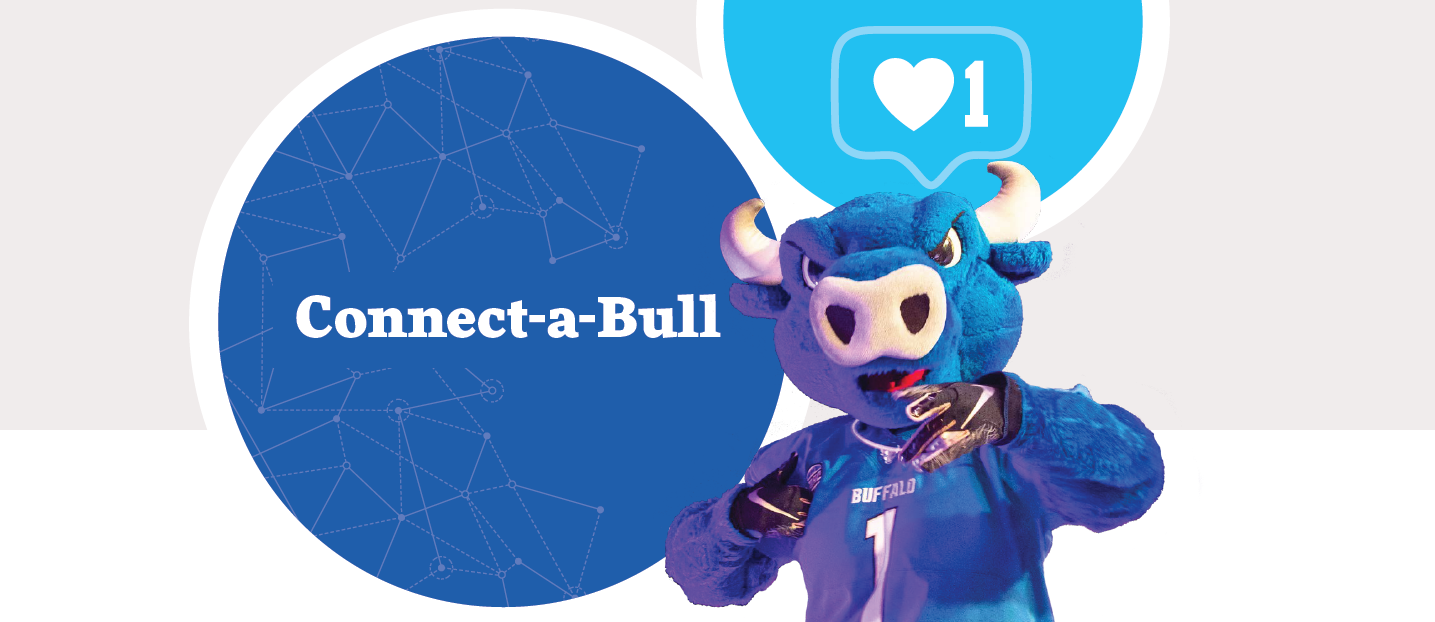Networking: Engaging with Contacts

Building a network is a powerful tool in your career exploration and planning.
In addition to meeting contacts at UB career events, class speakers and others within your personal network there are other places to identify contacts. The School of Management has almost 48,000 alumni in 87 countries across the globe. And alumni love to give back by helping you in your career exploration and planning. It is important to cultivate your network throughout your education and your professional career because mentorship is a powerful tool in your career exploration, planning and success.
Searching for a Contact
Connect-a-Bull
The University at Buffalo has developed a networking platform that allows students to connect with UB alumni interested in supporting you in all aspects of your career development.
Meet and network with professionals in Connect-A-Bull. Find people to talk to and filter by industry, location, hobbies, topics, job types, degrees and more.
Learn how to search for alumni in a specific geographic area using LinkedIn. Keep in mind that these contacts are not mentors. They are only alumni. But if you take a thoughtful approach and keep your request to information, you could start to build a relationship with the contact.
Career and Employer Events
- Employer Recruiting and Information Sessions
Companies like to educate their candidates about their recruitment programs and company culture before the interview. Attend open information sessions, ask questions and meet company representatives. To learn which companies have scheduled on-campus or virtual sessions, and to RSVP go to BizLink | Events. - Job Fairs and Events
Identify relevant career events in BizLink | Events and Handshake to meet recruiters and alumni, and learn about opportunities, hiring practices and expectations. Attend our annual career fairs in fall and spring along with Network New York events, held in January. Find additional career events and job fairs on our career events page. - Clubs and Professional Associations
Join a UB School of Management student organization. And consider joining local and national chapters of relevant professional associations. Refer to the career interest area pages to identify relevant associations or speak with your career advisor.
Reach out to a contact with genuine curiosity; expect information and advice. It is highly unlikely that alumni and friends of the school will know specific job openings. Do not ask them for a job or a referral. All you want is advice and information. They will serve as guides, idea generators and information providers.
Let the contact tell you about their career journey, company culture and operations, and maybe even the recruitment process. But do not ask for a job or internship. Ask for advice.
You may eventually turn an information provider into a personal "résumé distributor," but this only develops over time and after repeated positive contacts. Even if this relationship develops, remember that contacts cannot get you a job. They facilitate and provide information.
Send a LinkedIn invitation with a short personalized message. Be sure to mention how you are connected. Once the contact responds, the process can begin. It is important to respect the contact's time constraints. In your follow-up message, be prepared to provide information about your background and career interests to aid them in their ability to help you. You may contact multiple alumni, but stick to just two or three until you get the hang of it.
Customize Your Messages
When doing outreach it is essential to customize your messages to contacts. Our contacts who get emailed or called often will notice when the same terminology is used repeatedly and not respond as readily. If you choose to use AI-generated content, then make that your starting draft. You still need to do edits to make your emails relevant and unique.
Initial Message Through LinkedIn
Hi Jake. I see you are an alum of UB, where I am currently studying finance. It's very impressive that you earned your CFA early on in your career. I would love to connect and learn more about your career path.
Notice the brevity. It is key to understand why you want to connect specifically with this particular person and tailor each note when requesting a connection so they understand your genuine intention to learn from them (not ask for a job or internship).
After You Are Connected
Thanks for connecting. I noticed that you made a shift in your career from software development to finance during your MBA and that you have a very data-heavy focus within your banking role. I am looking to make a similar shift and am currently studying for the Azure certification. I am trying to decide if I want to sit for the CFA. Having a conversation with you about your story, what worked, what did not, some of the challenges and what you see as expectations of someone breaking into banking would be extremely valuable. Could we have a short phone or video call at your convenience?
This is a tailored sample for an alum from whom you want to learn. Communications to recruiters can be more transactional, but contacts who are not in recruiting roles should be learning-focused only. Do not think of LinkedIn connections as one-way relationships.
Emails to Contacts
When sending a direct email, explain the reason for your contact and be concise (two paragraphs long). Use formal business writing, and make sure it is free from errors or abbreviations.
The introduction should indicate that you are a UB School of Management student. In the following paragraph, describe the type of information you're seeking. Be specific; the more complete your email is, the more worthwhile your meeting with the contact will be.
If the contact has responded to your initial expression of interest, you may include a résumé. This will allow the contact time to gather any pertinent information you requested and to review your background and career interests.
Finally, ask if you can schedule a brief meeting. The meeting could be just a telephone call, or a virtual meeting through Zoom. If the contact is local you could leave it up to them to choose the format. There are some contacts who like meeting students in person and don't mind stopping by campus, or even meeting at their office or local coffee shop. Offer several dates and times for this meeting.
Email Examples
"Dear Mr./Ms. X:
I am currently a first-year MBA student at the University at Buffalo School of Management and received your alumni contact information from the Career Resource Center. As an alumnus, I am hoping you would be willing to share your insight of the NYC banking industry.
As the East Coast Regional Manager for First Republic Bank, I’m sure you are very busy. Would you be able to chat for 15 minutes to answer a few questions about some employment trends in banking you’ve noticed? We can talk by phone or video, whichever you prefer. Please let me know if you are open to connecting and a convenient time for us to meet.
I appreciate your help. Thank you for your time. I look forward to our conversation.
"Dear Mr./Ms. X:
I am currently a junior in marketing at the University at Buffalo School of Management and received your alumni contact information from the Career Resource Center. I'm interested in brand management and would love to hear about your career path at Unilever and any thoughts on marketing and CPG. Would you be open to a quick meeting (15 minutes) via phone or Zoom? If you are willing, please send me a couple days/times that would work with your busy schedule.
Thank you for your time. I would appreciate any help and look forward to connecting.
The Meeting
After you connect through email or LinkedIn, you can ask to arrange an appointment to conduct an informational interview. This meeting may be by telephone, video or in-person. In every scenario, you need to be prepared.
Introduce yourself and remind them of your initial contact. If you are calling to schedule an appointment, then explain that you are calling to arrange a convenient time when the contact has 15-20 minutes to answer some career- and industry-related questions. Be prepared during this initial telephone call with specific questions; even if the contact does not have time immediately, he or she will want an idea of the information you're seeking. It's difficult to make a good impression if you are not prepared.
If you've previously arranged a specific time to call or meet a contact, be sure to keep your appointment.
Introduce yourself again and remind the contact of any specific career or industry interests you stated in your previous email or telephone call. At this point, let the conversation take its course. Do not be pushy. You should expect this to be the first of several interactions.
You should have a list of prepared questions that focus on no more than three to five topics. Ask for advice frequently and listen attentively, taking notes as you go.
Visit the link below for a detailed list of questions regarding the contact's profession, industry, company and more.
Remember that this person has volunteered to help you. Someone who wants to help you in your job search is a great asset, so treat him or her as a valuable resource. Be sure to thank every contact for his or her time.
You should close with a thank you and ask if you may keep them informed about your progress. Not only will this be important for your career exploration, the contact will also appreciate your thoughtfulness. Perhaps later they will have additional thoughts and ideas to share with you or may hear of a job opening.
Always show appreciation by sending a follow-up email thanking the contact for their time, information and advice. See tips on writing a thank you email.
Try to offer information (like articles or posts) that you can send specifically to those who have helped you in return. This can help you build the relationship.
- Have questions prepared ahead of time (40 questions to ask in an informational interview)
- Always be polite, appreciative and respectful
- Do not monopolize their time
- If you get voicemail, be brief (10-20 seconds), speak clearly and leave your phone number, but say you will call back on a specific date/time
- Do your research about their company before you reach out to them
- Do not ask for a job
- Meet in person, if possible
- Use summer, winter and spring breaks to do geographic-specific networking
- Always send a thank you within a few days
- Follow-up is your responsibility
- Keep a record. Use one Excel sheet to track your connections, applications and target companies. Include the person's name, company, title, email, date sent, and the result of the interaction.
Not Sure How to Start? View this Virtual Networking Workshop
Get advice on how to network virtually and successfully. Access this recorded workshop (and more) in BizLink – Document Library.
Contact Us
Frank L. Ciminelli Family
Career Resource Center
School of Management
University at Buffalo
308 Alfiero Center
Buffalo, NY 14260-4010
Tel: 716-645-3232
Fax: 716-645-3231
mgt-crc@buffalo.edu
Office Hours
Monday-Thursday
8:30 a.m. - noon
and 1 p.m. - 5 p.m.
Friday
8:30 a.m. - 4 p.m.
If you have a scheduled meeting between noon and 1 p.m., please knock.
